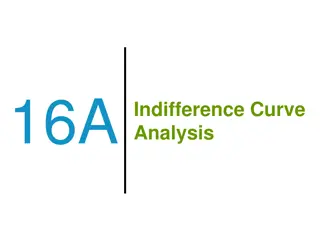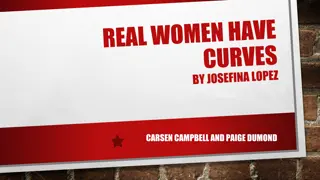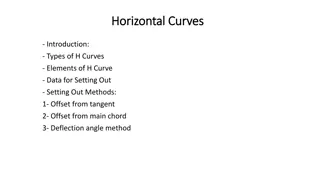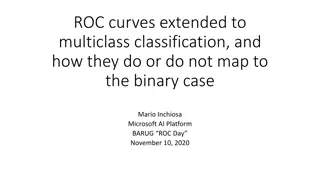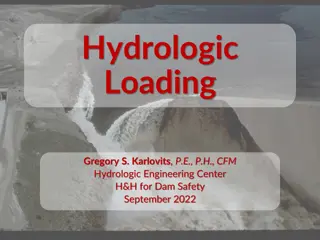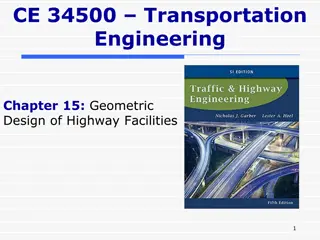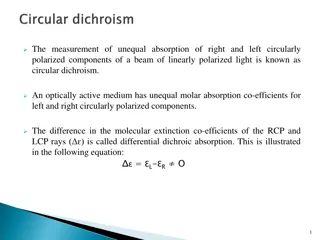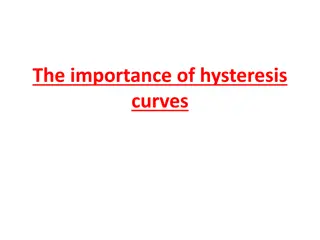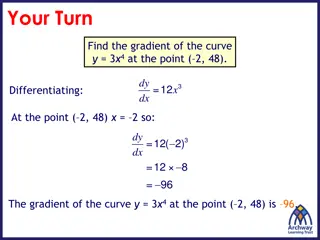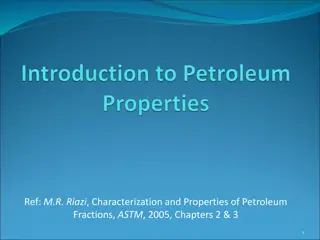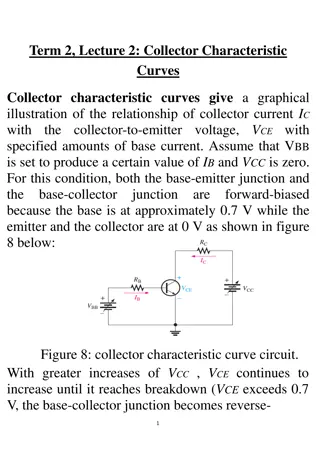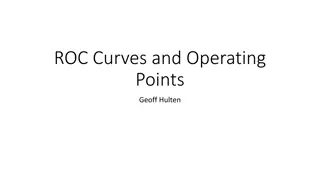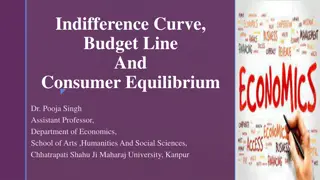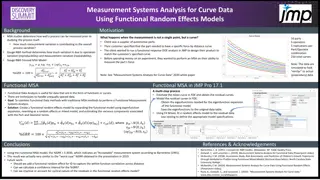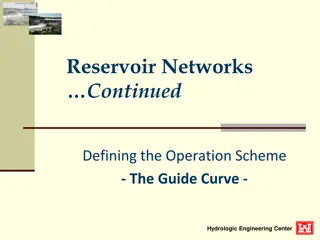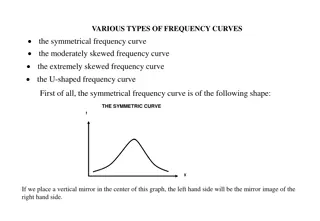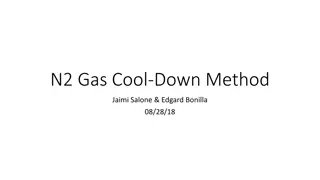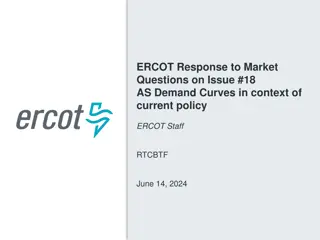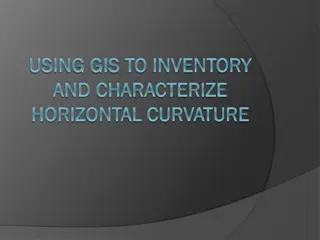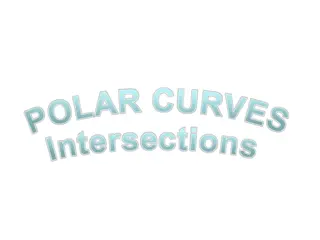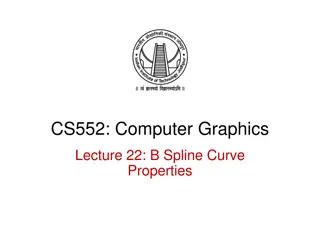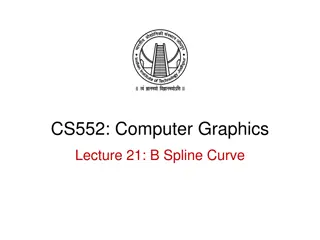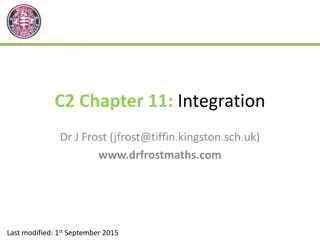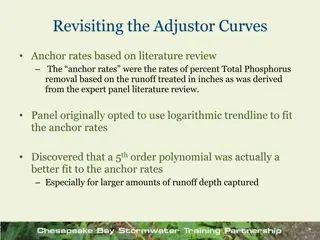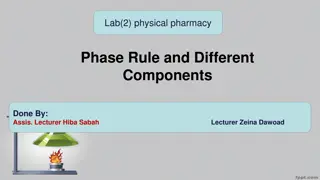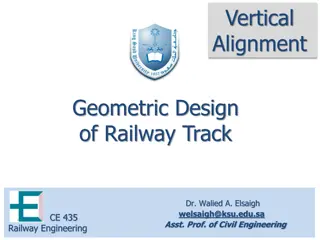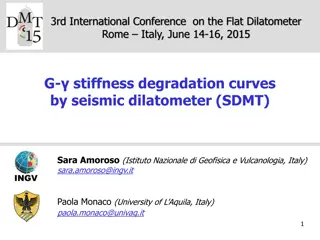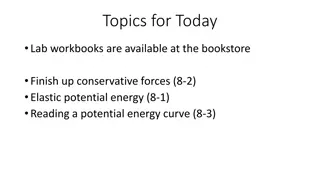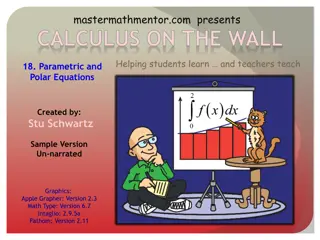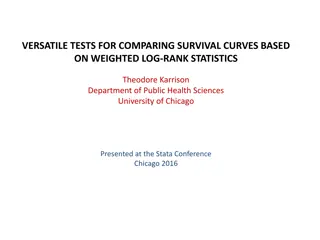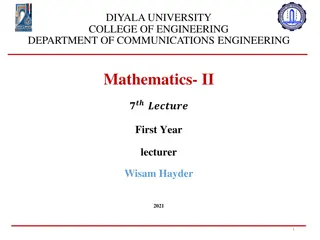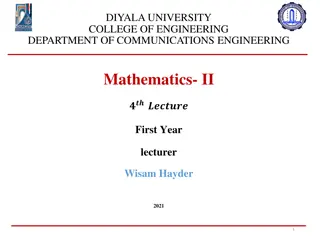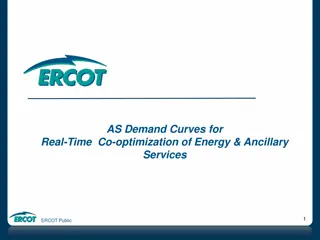Exploring Nonlinear Relationships in Econometrics
Discover the complexities of nonlinear relationships through polynomials, dummy variables, and interactions between continuous variables in econometrics. Delve into cost and product curves, average and marginal cost curves, and their implications in economic analysis. Understand the application of d
0 views • 34 slides
Understanding Indifference Curve Analysis in Economics
Indifference curve analysis in economics involves examining consumer preferences through the representation of various utility levels achieved from different combinations of goods. By combining indifference curves with budget constraints, optimal consumption bundles can be determined. The analysis i
0 views • 25 slides
Real Women Have Curves - Play Analysis
Analysis of the play "Real Women Have Curves" by Josefina Lopez, exploring themes of celebrating women's bodies, power of women, and immigrant experiences. The setting, characters, conflicts, and significance of the title are discussed in detail, emphasizing the play's message of breaking stereotype
0 views • 13 slides
Understanding Horizontal Curves in Road Design
Horizontal curves are essential in road design to safely change alignment or slope. This article covers types of horizontal curves, setting out methods, geometric shapes of curves, and elements such as PI point, PC point, and radius. Learn why curves are crucial for modern highways and how different
0 views • 25 slides
Understanding ROC Curves in Multiclass Classification
ROC curves are extended to multiclass classification to evaluate the performance of models in scenarios such as binary, multiclass, and multilabel classifications. Different metrics such as True Positive Rate (TPR), False Positive Rate (FPR), macro, weighted, and micro averages are used to analyze t
3 views • 8 slides
Understanding Hazard Curves in Dam Safety Risk Assessments
This content focuses on the role of hazard curves in dam safety risk assessments, emphasizing the level of effort required for their development and the use of HEC software. It highlights the three components of risk (hazard, performance, consequence), discusses hazardous loads and potential consequ
1 views • 58 slides
Geometric Design of Highway Vertical Curves and Criteria
This content covers the vertical alignment in transportation engineering, focusing on the geometric design of highway facilities, specifically vertical curves like crest and sag curves. It explains the main design criteria for vertical curves, including minimum stopping sight distance provision, dra
2 views • 24 slides
Optical Properties of Optically Active Compounds
Circular dichroism and optical rotatory dispersion are important techniques for studying the optical properties of optically active compounds. Circular dichroism measures the differential absorption of left and right circularly polarized light components, while optical rotatory dispersion studies th
0 views • 17 slides
Understanding Hysteresis Curves and Magnetic Materials in Electromagnetism
Hysteresis curves play a crucial role in understanding the properties of ferromagnetic substances like soft iron and steel. The differences in retentivity, coercive force, permeability, and susceptibility between these materials impact their performance in electromagnets and transformer cores. The c
1 views • 12 slides
Calculus Examples and Practice
Explore various calculus problems involving finding gradients, equations of tangents and normals, and analyzing curves. Practice determining gradients at specific points, solving for coordinates, and differentiating equations to find tangent and normal lines. Understand the relationship between grad
1 views • 11 slides
Understanding Petroleum Fraction Distillation Curves
Characterization and properties of petroleum fractions are essential for understanding their behavior, particularly through distillation curves. These curves depict the boiling points of crude oil or petroleum fractions, highlighting components' volatility ranges. Various methods like ASTM D86, True
0 views • 28 slides
Understanding Transistor Operation through Collector Characteristic Curves
Collector characteristic curves provide insight into the transistor's operation in various regions such as cutoff, saturation, and active. By analyzing the relationship between collector current (IC) and collector-to-emitter voltage (VCE) with base current variations, one can understand how a transi
0 views • 7 slides
Understanding ROC Curves and Operating Points in Model Evaluation
In this informative content, Geoff Hulten discusses the significance of ROC curves and operating points in model evaluation. It emphasizes the importance of choosing the right model based on the costs of mistakes like in disease screening and spam filtering. The content explains how logistical regre
7 views • 11 slides
Understanding Indifference Curve, Budget Line, and Consumer Equilibrium
Indifference curves and budget lines are essential concepts in economics to analyze consumer behavior and preferences. Dr. Pooja Singh, an Assistant Professor at Chhatrapati Shahu Ji Maharaj University, Kanpur, explains how indifference curves represent different combinations of goods that offer the
0 views • 9 slides
Functional Measurement Systems Analysis for Curve Data Using Random Effects Models
Measurement Systems Analysis (MSA) is crucial in determining the contribution of measurement variation to overall process variation. When dealing with curve data instead of single points, a Functional MSA approach using random effects models can be applied. This involves estimating mean curves, mode
0 views • 5 slides
Understanding Reservoir Operation Schemes: Guide Curves and Rules
Delve into the intricacies of reservoir operations through concepts like guide curves, zones, rules, and operation sets. Discover the essential elements that govern the decision-making process for storing and releasing water from reservoirs, ensuring optimal management and resource utilization.
0 views • 15 slides
Understanding the Phase Rule in Physical Pharmacy: Two Component Systems and Equilibrium Phases
The Phase Rule is essential in determining the state of a system based on components and phases. This study explores two-component systems in physical pharmacy, illustrating miscibility behaviors and equilibrium phases through diagrams and explanations. Understanding binodal curves, tie lines, and t
0 views • 12 slides
Understanding Quantitative Aspects of Drug Action
Explore the quantitative aspects of drug action, including drug receptor binding, concentration binding curves, dose-response curves, and types of antagonism. Learn to relate drug concentration to receptor binding capacity and response produced. Discover how concentration binding curves and dose-res
0 views • 29 slides
Understanding Various Types of Frequency Curves in Statistics
Explore different types of frequency curves such as symmetrical, moderately skewed, extremely skewed, and U-shaped curves. Symmetrical curves exhibit mirror images on either side, while skewed curves have longer tails on one side. Extreme skewness results in J-shaped or reverse J-shaped curves. The
0 views • 8 slides
Robust Parity Test for Extracting Parallel Vectors in 3D
Fundamental primitives for visualizing 3D data include line features like ridges and valleys of a scalar field, stream lines of a vector field, vortices of a velocity field, and extremal curves of a tensor field. Parallel Vectors (PV) provide a unified representation of 3D line features, forming con
0 views • 27 slides
Gas Cool-Down Method and Test Mass Curves Study
Diagrams and data charts illustrate the N2 gas cool-down method and test mass curves study conducted by Jaimi Salone and Edgard Bonilla on 08/28/18. The study focuses on maintaining pressure internally, cooling down the test mass efficiently, and achieving successful outcomes in pressure control acr
0 views • 9 slides
ERCOT Response to Market Questions on Issue #18 AS Demand Curves
ERCOT addresses concerns regarding AS demand curves and operational impacts in the context of current policy. Feedback covers topics like product priorities in scarcity, utilization of IRRs for Ancillary Services, and alignment of ORDC curve with operational needs.
0 views • 5 slides
Automated Tool for Inventorying and Characterizing Horizontal Curvature in Roadways
Improving highway safety is a priority for transportation departments. This project aims to develop a tool that automates the identification and characterization of horizontal curves in roadway networks using GIS technology. Roadway curvature, including horizontal curves, plays a key role in predict
1 views • 26 slides
Understanding Supply and Demand in a Competitive Market
This content delves into the concept of supply and demand in a competitive market as described by the renowned economists Paul Krugman and Robin Wells. It covers the basics of a competitive market, the dynamics of supply and demand curves, movements along curves, market equilibrium, and how prices a
0 views • 42 slides
Polar Curves: Intersections, Areas, and Calculating Enclosed Areas
Explore polar curves, their intersections, areas enclosed by curves, and calculating enclosed areas using given equations. Learn to sketch graphs, find points of intersection, polar coordinates, and apply formulas for finding enclosed areas with examples provided.
0 views • 21 slides
Understanding B-Spline Curves: Properties and Derivatives
Explore the mathematical properties and derivatives of B-Spline curves in Computer Graphics, including basis functions, local control, interval, and derivative computation. Learn how to derive mathematical expressions for different properties and solve problems related to B-Splines. Understand the i
0 views • 13 slides
Understanding B-Spline Curves in Computer Graphics
Exploring the advantages of B-spline curves over Bezier curves, this content delves into the representation, calculation of basis functions, and properties of B-spline curves. The discussion includes issues with Bezier curve representation, local control in B-spline curves, and the subdivision of th
0 views • 11 slides
Understanding Definite Integration in Mathematics
Delve into the concept of definite integration in mathematics with a focus on finding areas under curves, evaluating definite integrals, and solving exercises that involve calculating areas between curves and the x-axis. Explore the principles and techniques behind finding total areas between specif
0 views • 22 slides
Revisiting Adjustor Curves for Total Phosphorus Removal Rates
Based on a literature review, it was found that a 5th-order polynomial curve is a better fit than the originally used logarithmic trendline for anchor rates of percent Total Phosphorus removal related to runoff depth. The expert panel report reflects the old curves while trendline equations in FAQ d
0 views • 7 slides
AOTAsteroidal Occultation Time Analyser: Alternative Tool for Asteroidal Occultation Analysis
Create an alternative tool for analyzing asteroidal occultation light curves independently, focusing on D and R events. The methodology involves integrity checks, fitting test light curves, and applying camera-based corrections. Manual time stamp setting, calculating time stamps, and integrity check
0 views • 26 slides
Understanding Phase Rule and Components in Physical Pharmacy
Exploring the Phase Rule, components in physical pharmacy, and different types of systems with varying miscibility of components such as ethyl alcohol, water, and mercury. Learn about the binodal curve, tie line, and the impact of temperature and concentration on phase behavior in two-component syst
0 views • 12 slides
Understanding Vertical Alignment in Railway Track Geometric Design by Dr. Walied A. Elsaigh
Explore the vertical alignment of railway tracks through Dr. Walied A. Elsaigh's insights on curve length formulas, types of crest and sag vertical curves, properties of typical vertical curves, and a detailed example with solutions for calculating elevations at various stations along the curve. Lea
0 views • 10 slides
Insights into Soil Stiffness Degradation Using Seismic Dilatometer Data
This content discusses the analysis of soil stiffness degradation curves using data collected from the Flat Dilatometer and Seismic Dilatometer tests. Researchers Sara Amoroso and Paola Monaco present methods for deriving in situ G- decay curves and evaluating shear strain data in various soil types
0 views • 18 slides
Physics Lab Workbook Topics and Quizzes
Lab workbooks available, covering conservative forces, elastic potential energy, and reading potential energy curves. Quizzes on conservative forces and spring force demonstrations with darts. Understanding potential energy curves and turning points in mechanical energy.
0 views • 12 slides
Exploring Parametric and Polar Equations in Calculus
Dive into the world of parametric and polar equations with insights on graphing, tangents, conversions between polar and rectangular coordinates, and finding the area enclosed by polar curves. Discover the power of these mathematical representations in understanding complex curves and functions.
0 views • 6 slides
Versatile Tests for Comparing Survival Curves Based on Weighted Log-Rank Statistics
Overview of various statistical tests for comparing survival curves beyond the traditional log-rank test. The focus is on weighted log-rank statistics sensitive to non-proportional hazards scenarios, with examples and methodologies discussed. These tests aim to provide more nuanced insights into dif
0 views • 31 slides
Understanding Consumer Demand: From Utility Theory to Behavior in the Marketplace
We delve into the relationship between utility theory and consumer demand, exploring how individuals' tastes, preferences, and budget constraints influence their choices. Through examples like Neal's decision between snowboarding and jazz, we see how utility translates into demand curves, guiding co
0 views • 17 slides
Understanding Vector-Valued Functions and Motion in Space
Explore the concept of vector-valued functions and motion in space, including curves, tangents, position vectors, scalar functions, derivatives, and differentiation rules. Learn how to represent curves in vector form and understand the smoothness of a curve based on its derivatives. Gain insights in
0 views • 28 slides
Graphical Solutions of Autonomous Equations in Mathematics II
Explore the graphical solutions of autonomous equations in Mathematics II taught by lecturer Wisam Hayder at Diyala University's College of Engineering. Learn about phase lines, equilibrium values, construction of graphical solutions, and sketching solution curves using phase lines. Dive into exampl
0 views • 34 slides
Real-Time Co-optimization of Energy & Ancillary Services Demand Curves
Explore the concept of constructing demand curves for Regulation Up Service, Regulation Down Service, and Responsive Reserve Service from the ERCOT public data. Learn about modifying individual AS demand curves and allowing overlaps to enhance co-optimization and efficiency. Dive into an example AS
0 views • 17 slides

